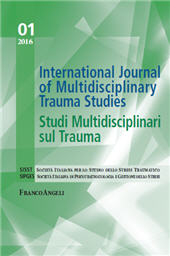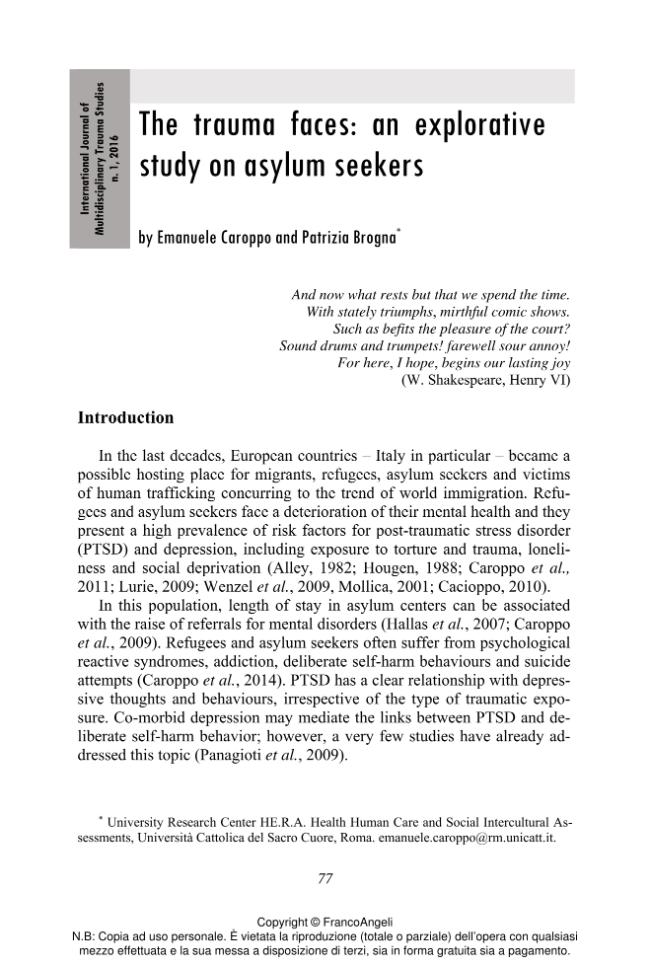The trauma faces : an explorative study on asylum seekers
77-89 p.
This study aims at better understanding the traumatic experience in the asylum seekers that was transferred in Italy in application of Dublin II and III Regulation. In particular we analyzed the asylum seekers that was transferred, at the moment of the identification of the European State Members (EU SM) competence of the asylum procedure, like vulnerable target. This is a common category established by the Art. 8 of the Legislative Decree 140/2005 foresees in Italy and its including: minors, disabled people, elderly people, pregnant women, single parents with children and persons who have been subjected to torture, rape or other serious forms of psychological, physical or sexual violence. We shall highlight the particular way in which people with this legal situation perceive their trauma life events and specifically how they are exposed to the greatest risk of PTSD and suicide. To this end we shall analyze the prevalence and incidence of mental health diseases in the asylum seekers and how the bias prevalen
ce about the Dublin Regulation increased the risk of the chronic vulnerability conditions especially the increase of psychological reactive syndromes, addiction and deliberate self-harm behaviours and suicide attempt. Our hypothesis is that the absence of a common program treatment, the dissemination of health information amongst Member States can have a negative impact on the global health of this target people.
Questo studio si propone di comprendere più efficacemente l'esperienza traumatic dei richiedenti asilo che sono stati trasferiti in Italia in applicazione delle revisioni II e III della Dublin Regulation. In particolare, abbiamo analizzato proprio i richiedenti asilo trasferiti al momento dell'identificazione, che compete allo Stato membro UE, come target di particolare vulnerabilità. Si tratta di una categoria diffusa e stabilita dall'art. 8 DL 140/2005 della nostra legislazione e riguarda: minori, disabili, anziani, donne in gravidanza, singoli genitori con bambini, persone che hanno subito torture, abuso o altre forme gravi di violenza fisica o sessuale. Vorremmo evidenziare la modalità particolare con cui i soggetti in questa situazione giuridica percepiscono i loro eventi traumatici e quanto siano esposti ad un maggiore rischio di PTSD e suicidario. A tal fine, analizzeremo la prevalenza ed incidenza dei disturbi psichici nei richiedenti asilo e vedremo quanto l'applicazione della Dublin Regulation aumen
ti il rischio di cronicizzare le situazioni di vulnerabilità precostituite, aumentando in particolare sindromi reattive, dipendenza, comportamenti autolesivi e tentativi suicidari. La nostra ipotesi è che l'assenza di un comune programma di trattamento, quindi formazione sulla mental health e comunicazione delle informazioni sulla loro salute tra gli Stati membri, abbia un impatto negativo sulla salute globale delle persone che rientrano in questo target.
Fa parte di
International Journal of Multidisciplinary Trauma Studies : Studi Multidisciplinari sul Trauma : 1, 2016-
Articoli dello stesso fascicolo (disponibili singolarmente)
-
Informazioni
Codice DOI: 10.3280/IJM2016-001008
ISSN: 2531-5242
PAROLE CHIAVE
- Vulnerabilità, richiedenti asilo, trauma, PTSD, gestione dei flussi migratori
- Vulnerable target, asylum seekers, trauma, PTSD, management of migration flows



